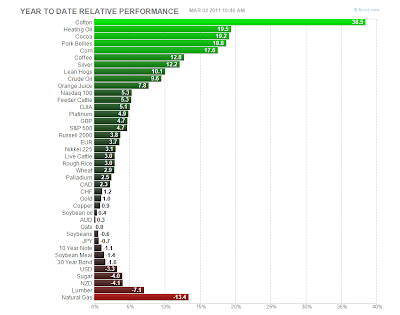I've written the past few quarters to keep your eyes on oil and rice. The former for obvious reasons and the latter due to the huge influence in most of the East. While many other commodity prices surged in 2010, rice was one of a handful (such as natural gas) that were limp. And thus far in 2011, price appreciation has been contained again.
[click to enlarge]
So in a relative sense, we've (they've) been lucky that the massive inflation in such things as corn, cotton, wheat and such has not hit in rice, or global turmoil would be taken to the next stage. [Mar 19, 2008: Philippines Brace for Rice Shortage] [Apr 6, 2008: Agflation Hits Rice - Prices Up 50% in 2 Weeks]
Via Bloomberg:
[click to enlarge]
So in a relative sense, we've (they've) been lucky that the massive inflation in such things as corn, cotton, wheat and such has not hit in rice, or global turmoil would be taken to the next stage. [Mar 19, 2008: Philippines Brace for Rice Shortage] [Apr 6, 2008: Agflation Hits Rice - Prices Up 50% in 2 Weeks]
Via Bloomberg:
- A global food crisis on the scale of what happened three years ago isn’t recurring because an increase in the cost of rice, a staple for half the world, has lagged behind a jump for other grains, according to the OECD.
- Rice futures rose 3.4 percent in the past 12 months, compared with 60 percent for wheat and 93 percent for corn. World milled-rice output will rise 2.4 percent to a record 451.7 million metric tons in 2010-2011, the U.S. Department of Agriculture forecasts, helping keep stockpiles near the highest in seven years.
- Rice prices almost tripled in the 20 months to April 2008, contributing to a worsening in world hunger that meant a record 1.02 billion people were deemed by the United Nations to be undernourished in 2009.
- “The scale of the problem is not as bad for large parts of the world as it was in 2008,” said Ken Ash, the trade and agriculture director at the Organization for Economic Cooperation and Development in Paris. “With two-thirds of the world’s hungry largely reliant on rice as a staple, rice prices have not increased and supplies are relatively strong.”
- Rice added to the previous peak in food costs in 2008, with prices climbing 33 percent in 2007 and another 11 percent the next year, after export bans by producers including Cambodia, Vietnam, India and Egypt. Rice, which jumped as high as $25.07 for 100 pounds in Chicago in April 2008, traded at $14.315 ...today.
- Global food prices rose 28 percent in the past 12 months and reached a record in January, according to the UN’s Food and Agriculture Organization. That’s fueled riots across North Africa and the Middle East that have already toppled leaders in Tunisia and Egypt. More than 60 food riots occurred worldwide from 2007 to 2009, according to the U.S. State Department.
- Rice planting in the U.S., the world’s third-largest exporter, may drop 25 percent this year because growers can earn more from corn and soybeans, according to the median in a Bloomberg survey of nine analysts and farmers in January.
- “Good seasons” in parts of Africa and Asia have helped build up grain supplies there to levels above those of 2007-08, reducing the impact of rising world prices, Ash said. “Local grain supplies in parts of Africa and Asia are very good.”
